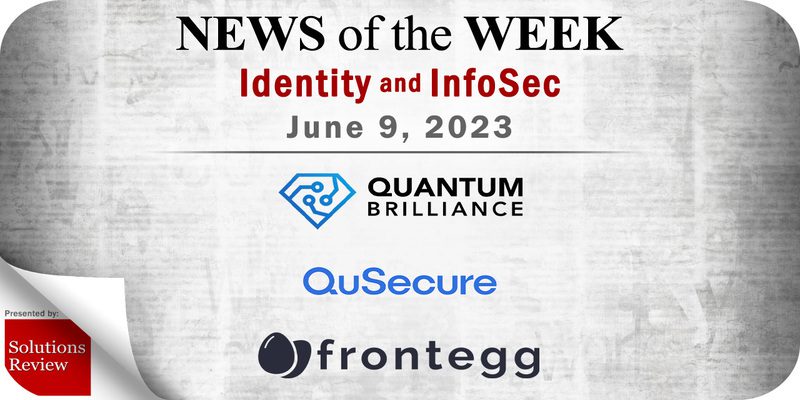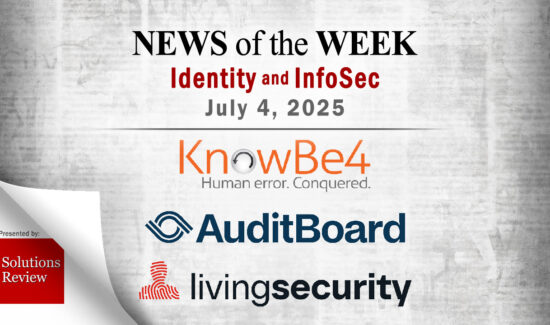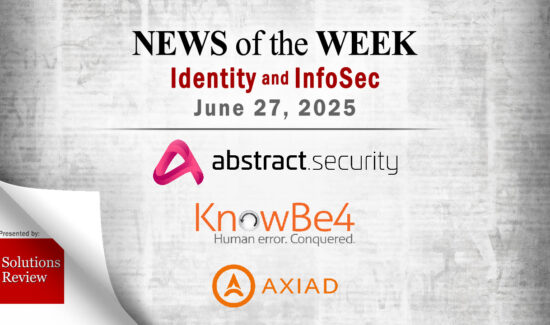Identity Management and Information Security News for the Week of June 9; Quantum Brilliance, QuSecure, Frontegg, and More


The editors at Solutions Review have curated this list of the most noteworthy identity management and information security news for the week of June 9. This curated list features identity management and information security vendors such as Quantum Brilliance, QuSecure, Frontegg, and more.
Keeping tabs on all the most relevant identity management and information security news can be a time-consuming task. As a result, our editorial team aims to provide a summary of the top headlines from the last month, in this space. Solutions Review editors will curate vendor product news, mergers and acquisitions, venture capital funding, talent acquisition, and other noteworthy identity management and information security news items.
Widget not in any sidebars
Identity Management and Information Security News for the Week of June 9
Quantum Brilliance Releases Open-Source Software for Miniature Quantum Computers
This week, Quantum Brilliance, a quantum computing solutions and hardware provider, announced the full release of the Qristal SDK, an open-source software development kit for researching applications that integrate the company’s portable, diamond-based quantum accelerators. Previously in beta, the Quantum Brilliance Qristal SDK is now available for anyone to develop and test novel quantum algorithms for real-world applications specifically designed for quantum accelerators rather than quantum mainframes. Potential use cases include classical-quantum hybrid applications in data centers, massively parallelized clusters of accelerators for computational chemistry and embedded accelerators for edge computing applications such as robotics, autonomous vehicles and satellites.
QuSecure Awarded U.S. Army Contract for Post-Quantum Cybersecurity Solutions
QuSecure, Inc., a leader in post-quantum cybersecurity (PQC), this week announced the United States Army has awarded the company a Small Business Innovation Research (SBIR) Phase II Federal Government contract to develop quantum-resilient software solutions. With this award, QuSecure will continue to advance research and development of quantum-resilient technologies and encryption solutions for the U.S. Government. The award states that QuSecure’s work has merit, will result in important benefits for the Army, and allots upwards of $2 million to address uses in tactical edge and tactical IoT devices that can be used for battle–ready deployment.
Rezonate Delivers Identity-Centric Security Solution to AWS Marketplace
Rezonate, an identity-centric security platform, announced this week further advancements in its relationship with Amazon Web Services (AWS), bringing its platform to the AWS Marketplace. The availability of Rezonate on AWS Marketplace simplifies the process for mutual customers to continuously prevent identity risks and stop active attempts in real time, particularly as more critical data and applications transition to the public cloud. Rezonate provides a comprehensive view of all identities and their access routes to multi-cloud assets and critical SaaS applications, including federated privileges from different identity providers. This offers security and infrastructure teams an identity-centric security framework to automate the remediation of exposure risk and respond faster to active attacks.
LogicGate Introduces OpenAI Integration
This week, LogicGate, a risk management solutions provider, introduced a new OpenAI integration that will help automate and inform GRC processes, including policy generation. The integration of OpenAI will help LogicGate customers easily implement and utilize AI technology with current Risk Cloud applications, scale content generation, and quickly solve complex problems with AI-powered systems and models like GPT-4.
Frontegg Unveils Entitlements Engine
Frontegg, an identity and access management provider for SaaS companies, this week announced the launch of its Entitlements Engine, powered by its unique Context-Aware Logic Controls (CALC) technology. Entitlements Engine provides app builders and revenue teams with fine-grained feature authorization designed to meet modern SaaS builders’ need for speed of deployment and flexibility. Frontegg delivers this capability through a visual dashboard that allows non-technical users to design product bundles in minutes without adding additional code, complex configurations or products from other vendors.
Expert Insights Section
 Watch this space each week as Solutions Review editors will use it to share new Expert Insights Series articles, Contributed Shorts videos, Expert Roundtable and event replays, and other curated content to help you gain a forward-thinking analysis and remain on-trend. All to meet the demand for what its editors do best: bring industry experts together to publish the web’s leading insights for enterprise technology practitioners.
Watch this space each week as Solutions Review editors will use it to share new Expert Insights Series articles, Contributed Shorts videos, Expert Roundtable and event replays, and other curated content to help you gain a forward-thinking analysis and remain on-trend. All to meet the demand for what its editors do best: bring industry experts together to publish the web’s leading insights for enterprise technology practitioners.
Submarine Cables: Cyber Risks and Consequences
Martin Lee of Talos dives deep into the cyber risks presented by submarine cables, and the consequences of ignoring them. At the best of times, the seabed can be a hostile environment. Fishing, errant anchors, geological activity, and the corrosive effects of seawater all act to ensure that the expected design life of an undersea cable is 25 years. Failure of submarine infrastructure is not unexpected. The loss of a single cable can be planned for. The architecture of the internet means that the packets of data carrying information can be switched and rerouted around areas of disruption. If redundant routes exist, network availability should not be interrupted despite the severing of a connection. However, as excess traffic is squeezed into the remaining connections and the contention ratio increases, the quality of connections may degrade.
Embracing Biometrics to Increase Authentication Safety
“Good practice and discipline are essential for maintaining password safety, as well as embracing technologies that utilize physical characteristics for authentication – biometrics – as an additional stopgap. Both passwords and biometrics have their own advantages and disadvantages. Passwords are easy to set up, easy to use and can be changed frequently to enhance security. However, they are more easily compromised if they are easy to guess or shared with others. Biometrics, while more difficult to compromise, can be expensive to set up and maintain, and there are concerns about privacy and the collection and storage of personal data. We use biometrics more and more throughout everyday life without noticing the handoff of the security check. Being conscious of the layers of security in your digital life will set you up for security success: biometric passwords for devices you trust to act as your security broker, password keepers (sometimes with biometric logins) and multi-factor authentication. A current challenge is the hand-off between devices while still maintaining security; password keepers and even biometrics will eventually become seamless in order to maintain a higher level of security. AI brings an additional layer of concern around security, as it can brute force not just passwords but email addresses as well. Email addresses are much more secure than passwords – there have been estimates that it is 36 times easier to guess a password than an email address, due to the number of permutations in existence. Actively using resources like haveibeenpwned.com to check for security breaches and data loss is a great personal exercise. Ultimately, the choice between passwords and biometrics depends on the level of security needed and resources available.”
– Rob Price, Director, Field Security Office at Snow Software
Passwords Are Here to Stay; Adhering to Best Practices Matters
“Despite passwordless authentication being a recent trend, passwords will definitely continue to serve as the simplest and most effective means to secure identities in 2023. They are easy to use, can be changed if needed, and do not demand additional software or hardware to function. As crucial as they are for identity security, passwords can also be vulnerable to various attacks. Weak and easy-to-remember user passwords are usually the main cause behind these attacks. Additionally, seldom changing passwords and using the same login credentials for multiple online platforms and personas creates a higher risk of falling victim to password attacks. The only way in which organizations can withstand password attacks is by adhering to the password best practices recommended by regulatory standards. Employing longer passwords, as suggested by NIST, works wonders in defending against sophisticated password attacks. Including all character types and symbols, and avoiding dictionary words, common patterns, and usernames in passwords enhances their complexity and security. Compliance regulations like the GDPR, HIPAA, and the PCI DSS also recommend that companies use multi-factor authentication (MFA) methods to bolster identity security.”
– Manikandan Thangaraj, Vice President at ManageEngine
Widget not in any sidebars


















